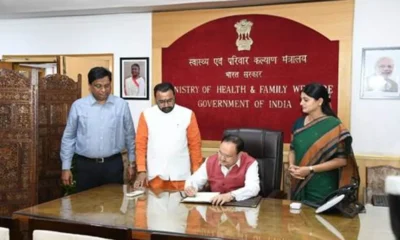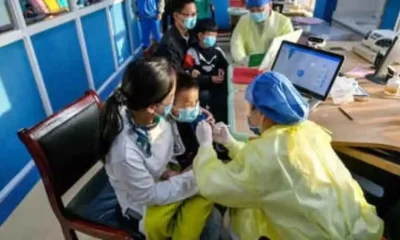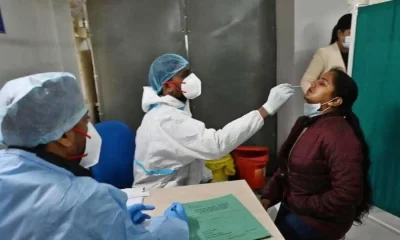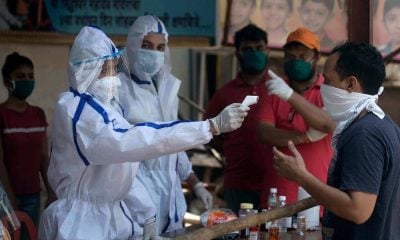At least nine people have died in Kerala’s Kozhikode district due to Nipah virus, an infection with high fatality rate that spreads mainly through bats, pigs and other animals, or contact with an infected person.
Unconfirmed reports in media, however, put the death toll at 12.
There is no cure – either vaccine or medicine – for the disease and only form of treatment is supportive medicines and palliative care.
Lini, a nurse who attended to the two men who died, was herself hospitalised for a week before she died Monday morning. Her body was cremated at the electric crematorium immediately triggering strong protests from her relatives because it was not handed over to them.
The body of another person who died, Velauthan (64), was also cremated in the electric crematorium to prevent the disease from spreading. Agitated heath workers complained that they have not been given enough precautionary gadgets to contain the infection.
Union Health Minister JP Nadda tweeted on Sunday that he had asked the chief of the central disease control body to visit the affected district and take steps. A high-level team from the National Centre for Disease Control (NCDC) arrived in Kerala’s Kozhikode on Monday.
“We have confirmed nine deaths. Out of these only three are Nipah positive. We have sent samples of other deceased to the National Virology Institute in Pune. We can ascertain the exact cause of death only after obtaining results,” said State Health Secretary Rajeev Sadananndan, according to a report in The Hindustan Times (HT).
Two of the deaths on Monday took place in the Kozhikode Medical College and two others died at the taluk hospital.
The Union Health Ministry has rushed a team of experts to assist the state.”A team from the Indian Council of Medical Research is arriving in Kozhikode on Monday. We are trying our best to contain the spread of virus and we sought help from all,” HT quoted Kerala health secretary Sadanandan as saying.
The confirmation of Nipah virus came on Sunday night, with Kerala’s Health Director RL Saritha announcing, “The National Virology Institute in Pune has confirmed that the dead were infected with Nipah virus,” reported HT.
At least 12 people are admitted in various hospitals and 20 others are under observation. Many families who were staying closer to the affected dwellings have been evacuated to safer places and domestic animals are also under observation, a senior health official said. The state health department has decided to set up isolation wards in government and private hospitals to contain the deadly virus.
The outbreak started with the death of three members of a family in Perambra in a span of two weeks. At least four others of the family are admitted in the hospital with same symptoms. Local people said they had informed the authorities after the death of some domesticated animals but their complaints were ignored.
According to the World Health Organisation (WHO) India reported two outbreaks of Nipah virus encephalitis in West Bengal, bordering Bangladesh, in 2001 and 2007. Seventy one cases with 50 deaths (70% of the cases) were reported in two outbreaks.
The first identification of Nipah virus as a cause of an outbreak of encephalitis was reported in 2001 in Meherpur district of Bangladesh. The WHO says Nipah virus (NiV) encephalitis is an emerging infectious disease of public health importance in the South-East Asia Region.
The incubation period for the virus ranges from 5 to 14 days. Symptoms become visible after this period and include fever, head ache, fainting and nausea. In some cases, symptoms like choking, stomach pain, vomiting, fatigue and blurred vision could also be there.
The patient can possibly go into a coma just two days after the symptoms begin.
The chance of contracting encephalitis that affects the brain is also high.
Precautions include avoiding food that could have been contaminated by bats by biting it or dropping faeces on it.
Toddy that is brewed in open containers near palm trees should be avoided.
In case a person is infected, it is important to maintain a distance from the patient person and to sanitise and wash hands thoroughly.
Clothes, utensils and items typically used in the toilet or bathroom, like buckets and mugs, should be cleaned separately and maintained hygienically.
Is important to cover one’s face while transporting the dead body of anyone who dies after contracting Nipah fever and should take utmost care while bathing the body before cremation or burial, reported NewsMinute.


 India News18 hours ago
India News18 hours ago
 India News20 hours ago
India News20 hours ago
 Latest world news5 hours ago
Latest world news5 hours ago
 LATEST SPORTS NEWS5 hours ago
LATEST SPORTS NEWS5 hours ago
 India News5 hours ago
India News5 hours ago
 India News4 hours ago
India News4 hours ago













